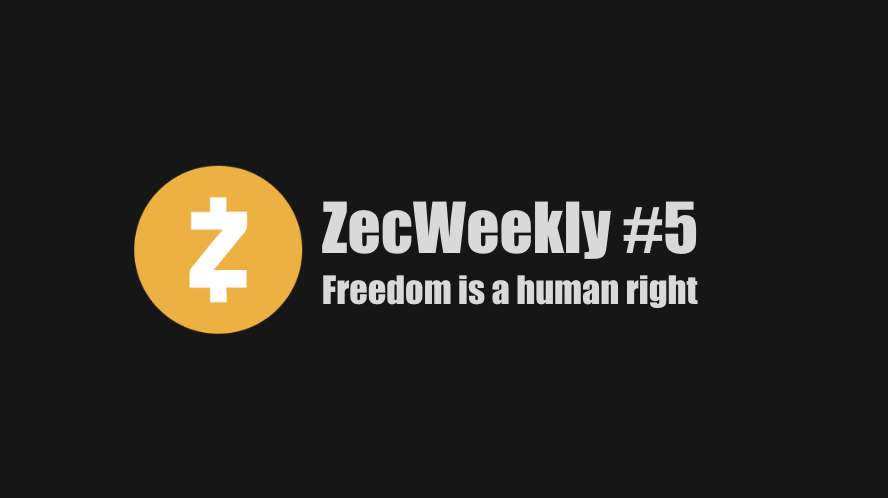Zcon3 was an amazing time. Members of the Zcash community were able to come together and discuss the work they’re doing in the space.
Our work isn’t about privacy. Our work is about giving people the ability to choose what information they broadcast to the world. Giving people the freedom to express themselves.
Our work is about freedom and consent.
This week, that work is under threat. I will write nothing further on that.
But, I will use this week’s newsletter as an opportunity to remind everyone how cryptocurrencies have been used by marginalized communities, not as a criminal tool, but as a lifeline.
Below are some articles, with selected quotes, which demonstrate that.
Crypto is a tool for human rights
Russian activists turn to crypto for donations to aid Ukrainian refugees
For some, crypto is also safer than fiat donations: Russians who want to help Ukrainians face political threats at home, where such help might be recognized as treason – and with bank transfers, any donation can be immediately traced back to the donor.
Afghans use cryptocurrency to keep their wealth out of the Taliban’s hands
Cryptocurrency booms are often fueled by dreams of life-changing riches. In Afghanistan, buyers are instead snapping up digital coins in hopes of preserving what wealth they have—and keeping it out of the Taliban’s reach.
Cubans use crypto to escape communism and global financial sanctions
The key moment came in 2020, when the Trump administration banned Americans from sending remittances to their families through Western Union, which was the main way for many Cuban Americans to send money to their families. With families suffering, people looked for new ways to send money. When Western Union ceased to exist, there was a big rise in remittances via cryptocurrencies.
Venezuelans turn to crypto to fight against hyperinflation
As hyperinflation and U.S. sanctions disrupt Venezuela's economy, cryptocurrency is emerging as a way to provide services handled elsewhere by the traditional banking system. It has become a tool to send remittances, protect wages from inflation and help businesses manage cash flow in a quickly depreciating currency.
Nigerians turn to crypto because the naira is falling
The Central Bank of Nigeria devalued the currency, the naira, by 24% last year. There are fears of a further fall in value by as much as 10% this year. Meanwhile prices continue to rise, with food inflation climbing to its highest point since July 2008. Despite the currency's volatility, Nigerians sees it as a valuable tool to "hedge" or reduce the risk of living in what they describe as a high-risk environment.
Ukraine received more than $30m in crypto donations
The amount of crypto raised for Ukraine-based aid had surpassed $30 million, across a number of funds and efforts. One group even raised the equivalent of $1 million in a mere 30 seconds. Donor contributions of digital assets like Bitcoin soared nearly twelvefold over the previous year, totaling more than $330 million in total contributions in 2021. Nearly half of crypto donors were likely to give $1,000 or more, compared to only 33% of all investors.
Why Argentines are turning to stablecoins like DAI
Argentines have reasons to distrust the traditional system – in 2001, through a process known as “corralito”, dollar accounts were frozen and part of the money was returned, in local pesos, after a strong devaluation. The adoption of DAI became popular because, being a stablecoin and having a quotation linked to the U.S. dollar, many Argentines have decided to acquire it as an indirect form of dollarization.
Cubans use Bitcoin because financial services reject them
For businesses, it is impossible to use payment gateways to automate the sale of a book or a simple delivery service in Cuba over the internet, unless a business owner has a relative, friend or business partner abroad who can do that with a non-Cuban identity. Bitcoin fixes this.
Navalny ally urges donors to use cryptocurrency due to crackdown
The movement of money within the Russian banking system is clear and transparent to the Russian state, and therefore you and I need to get away from it. Since the state is squeezing us out of simple and understandable collection of donations through the normal banking system, it means we will patiently teach everyone to use cryptocurrencies, and we will learn ourselves.
Cubans want to buy and sell things online like everyone else
Due to US sanctions, ordinary Cubans find themselves cut off from the global financial system: They cannot start a Spotify subscription, buy a domain name, or pay for a website-hosting service using a card. This means that if Cubans wish to partake in online commerce, particularly with another country, they have to use cryptocurrencies.
We need privacy for freedom
All of these pieces show how crypto has been used by people who don’t have access, or easy access, to the dollarized economy. They’ve turned to things like Bitcoin, USDT, DAI and other cryptocurrencies to give them the economic freedom they deserve. But more and more, people are realizing that the systems’ public ledgers won’t always give them the safety they need.
It is crucial that we continue to build privacy-preserving technologies to ensure that users have financial freedom. Users need to be safe when using decentralized money systems, and crypto’s privacy tech provides a crucial layer of security for them.
I don’t know how all of this will shake out, but I do know there are millions of normal, hard-working people who use privacy tools to give them more safety, security and financial freedom.
We cannot let them take that away from us.





